Assessment and Communication of Climate Impacts of Food (CLIF)
"Food systems can and must play a leading role in addressing all of the challenges to realize the Sustainable Development Goals by 2030 "
In just a few years, 'food systems transformation' has become a widely used term in the food and agriculture sector, gaining significant global attention, particularly at the 2021 UN Food Systems Summit. Its importance cannot be overstated, as it brings together several areas that are critical to the future well-being of people and the environment. Food systems provide the foundation for global food security, nutrition, and livelihoods of almost eight billion people. At the same time, current unsustainable food systems are driving several intersecting social, ecological and health crises of global concern, and jeopardizing progress towards the Sustainable Development Goals. The persistent and growing issues of hunger, food-borne diseases, poverty, environmental degradation, and climate change call for a fundamental transformation of food systems.
However, despite increasing international attention and calls for food systems transformation, it remains unclear what transformation means in different contexts, how it can be achieved and how seeming trade-offs between policies or various sustainability goals can be overcome. As the term becomes increasingly overused, it risks losing its clarity and focus, with little consensus on its specific goals or the pathways to achieve them.
TMG aims to address these challenges by contributing to a systemic understanding of food systems transformation. As part of the Assessment and Communication of Climate Impacts of Food (CLIF) project, coordinated by WWF and funded through the International Climate Initiative (IKI) of the German Federal Ministry for the Environment, Nature Conservation, Nuclear Safety and Consumer Protection (BMUV), we developed a series of reports. This FORESEE (4C) series explores the intersections between food systems and four critical crises: Climate, (Post-)Covid, Conflict, and Costs.
Our approach:
Comprehensive review of international food systems literature and conferences and analysis of political and conceptual frameworks
Workshops with the CLIF Expert Advisory Group, consisting of a multi-disciplinary group of international experts with diverse backgrounds, including social and political sciences, food security, agriculture, health and nutrition, human rights, Indigenous Peoples, trade, food economics, biotechnology, climate change, natural resource management and biodiversity
Online Expert Consultations and international debates
The results:
2 Scoping studies
Dissemination of the results in 17 webinars and at 4 high-level events
In our report series, we propose a set of actionable approaches to achieving meaningful change of agri-food systems. Some highlights of our report series:
Using a decision-support tool to guide the transformation: To ascertain the agents ("who") and drivers ("what") pivotal for the successful transformation of agri-food systems we developed the Agri-food Systems Transformation Protocol. It serves as a decision-support tool at the strategic and operational level to guide diverse actors in the development of systemic solutions for sustainable agri-food systems. The Protocol proposes a four-stage and nine-step iterative process that can guide the development of transformation pathways in different contexts and at different levels of implementation.
Establishing a multi-level governance framework: Acknowledging the lack of international consensus on driving factors of Food Systems Transformation and the necessary agents supporting its implementation globally, we advocate for a multi-level governance framework, incorporating global agreements (primarily the three Rio Conventions - CBD, UNCCD, and UNFCCC), national pathways, and local implementation. As stewards of the environmental pillar of the 2030 Agenda, the Rio Conventions can play a stronger role in steering food systems transformation by jointly monitoring agri-food systems' impacts, issuing annual reports, and recommending pathways to meet international targets in collaboration with Member States. Our proposal is detailed in an open letter to the heads of the three conventions.
Uncovering and tackling hidden costs: Addressing hidden costs is crucial for sustainable food systems transformation. Economic systems often privatize profits while externalizing costs, such as environmental damage and rising healthcare expenses. These hidden costs, exceeding USD 10 trillion annually according to the FAO’s SOFA 2023 and 2024 report (informed by our background paper), surpass the global GDP contribution of food systems, highlighting a destructive imbalance. True Cost Accounting (TCA) integrates economic, environmental, social, and health factors into decision-making, fostering sustainable development. Our fifth report outlines pathways such as Beyond GDP frameworks, sustainability reporting, public procurement, and consumer labelling to embed TCA in policies and practices, aligning food systems with sustainable economic models.
Details
Team
Publications

Report
FORESEE (4C) Report 5: Changing the Equation: Leveraging True Cost Accounting to Accelerate Agri-food Systems Transformation
This report promotes True Cost Accounting to reveal hidden environmental, social, and health costs in agri-food systems.
Written by Lisa Klaus, Olivia Riemer, Alexander Müller
Published on Oct 31, 2024
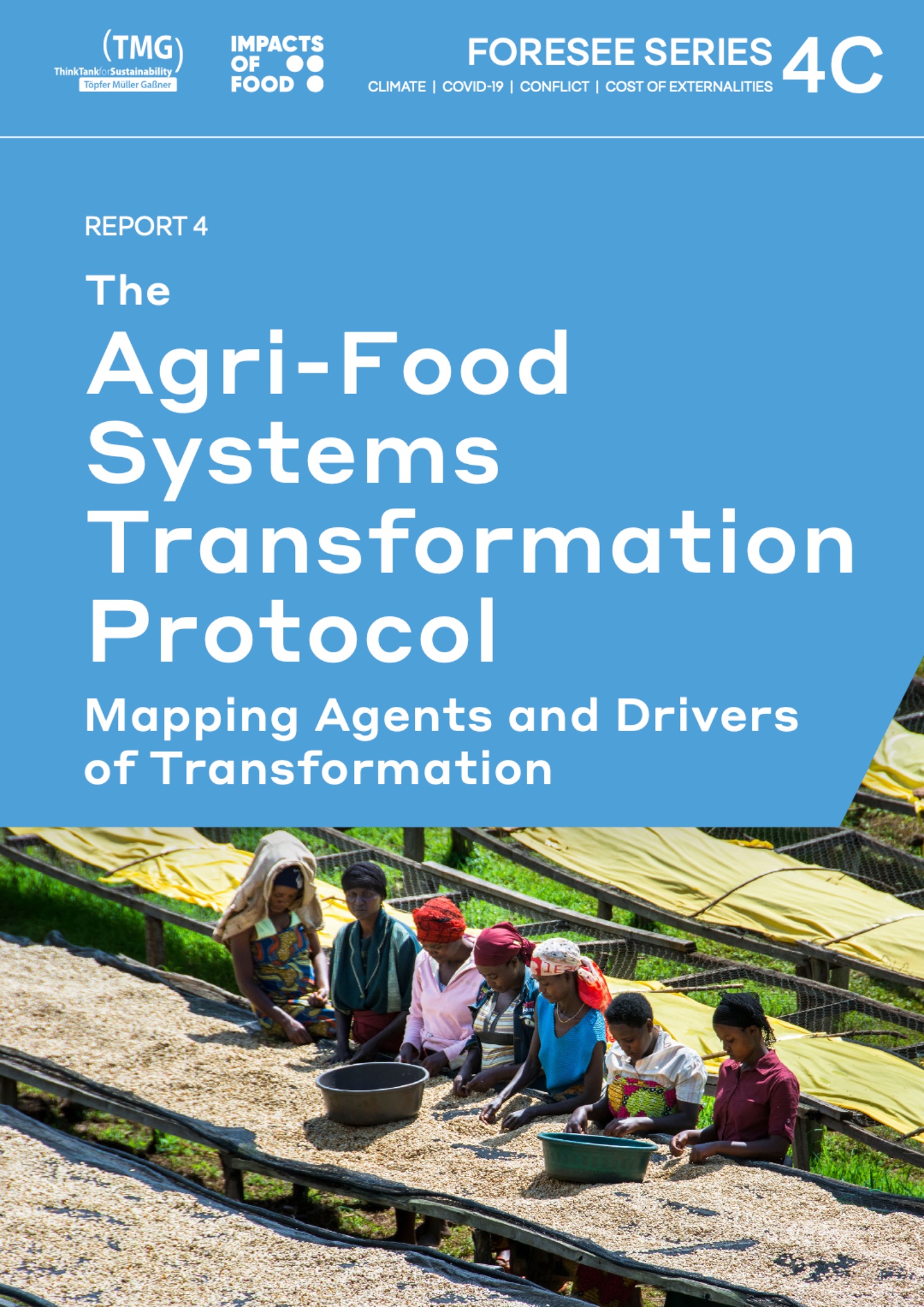
Report
FORESEE (4C) Report 4: The Agri-Food Systems Transformation Protocol - Mapping Agents and Drivers of Transformation
Exploring key actors and catalysts for agri-food systems transformation.
Written by Tavseef Mairaj Shah, Olivia Riemer, Nadia El-Hage Scialabba, Alexander Müller
Published on Dec 04, 2023
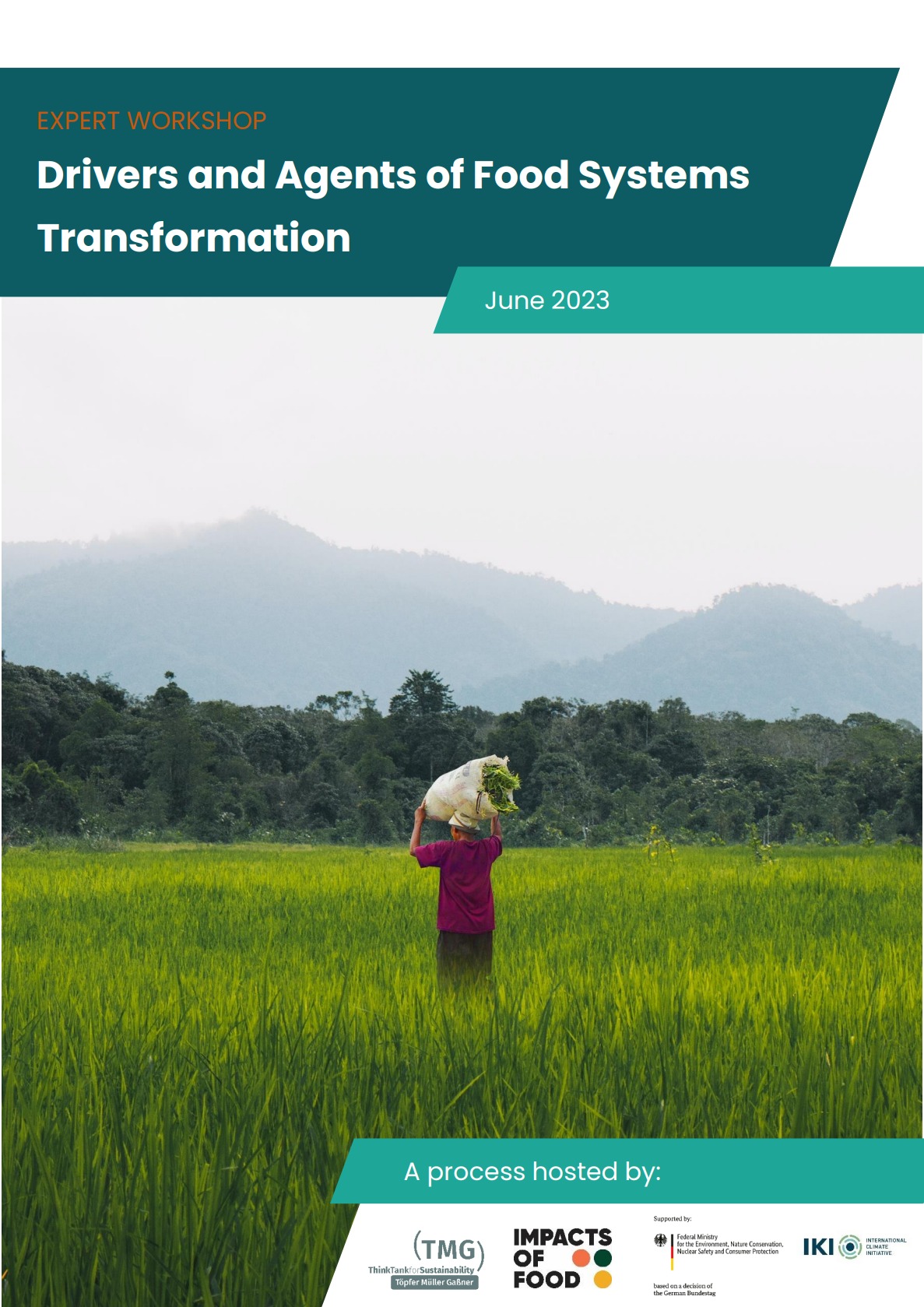
Report
Joint Conclusions
Key messages on food systems transformation from the expert workshop hosted by TMG Research in Rome, June 2023
Written by CLIF Team
Published on Jul 12, 2023

Declaration
Open letter to Heads of the three Rio Conventions
A call to systemically address agri-food sector externalities in global environmental governance
Written by Alexander Müller
Published on May 22, 2023
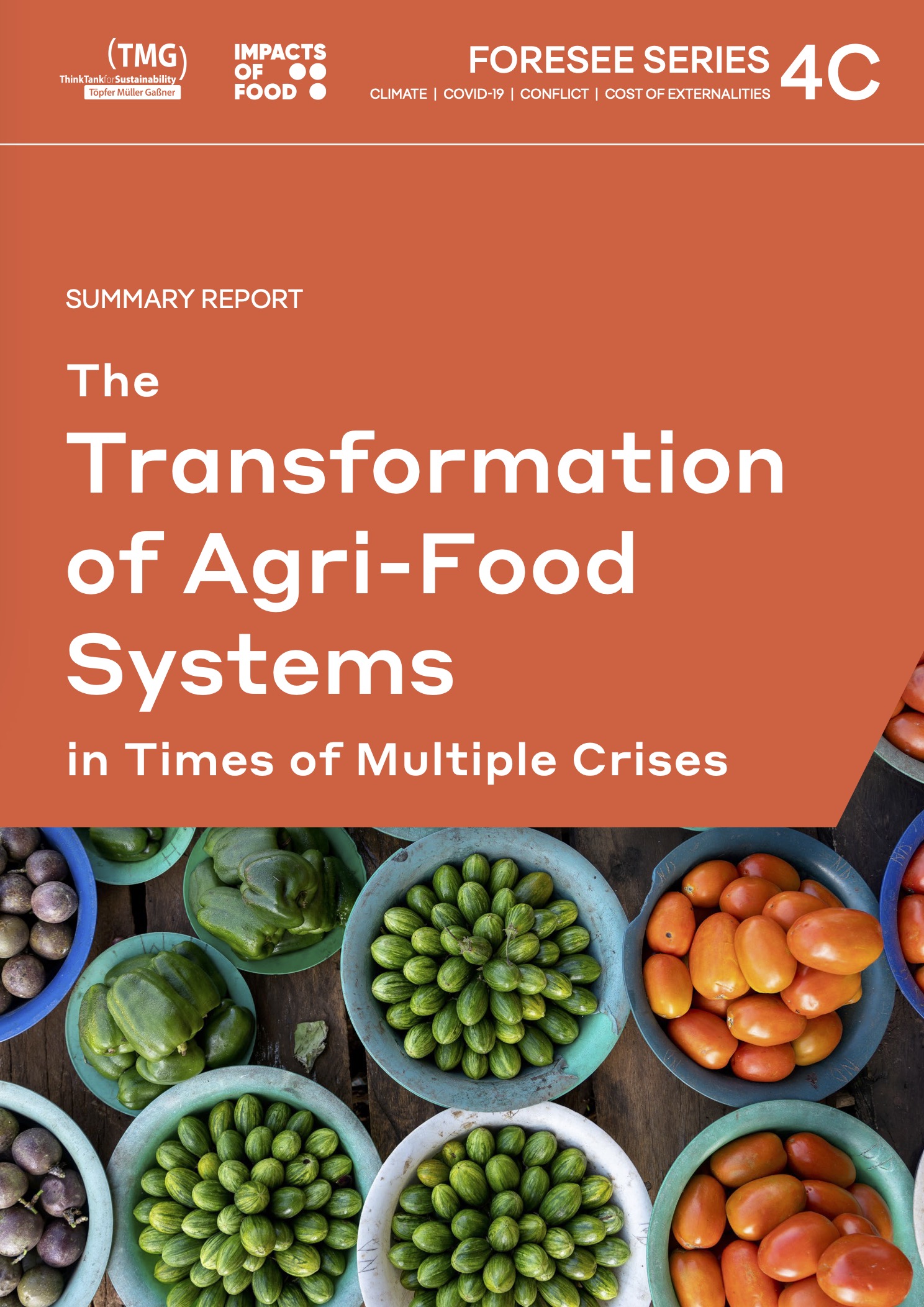
Report
FORESEE (4C) Summary Report: The Transformation of Agri-Food Systems in Times of Multiple Crises
Exploring equitable, healthy, resilient and sustainable pathways for agri-food transformation. This is a summary of the FORESEE (4C) series: Reports 1, 2, and 3.
Written by Tavseef Mairaj Shah, Olivia Riemer
Published on Apr 03, 2023
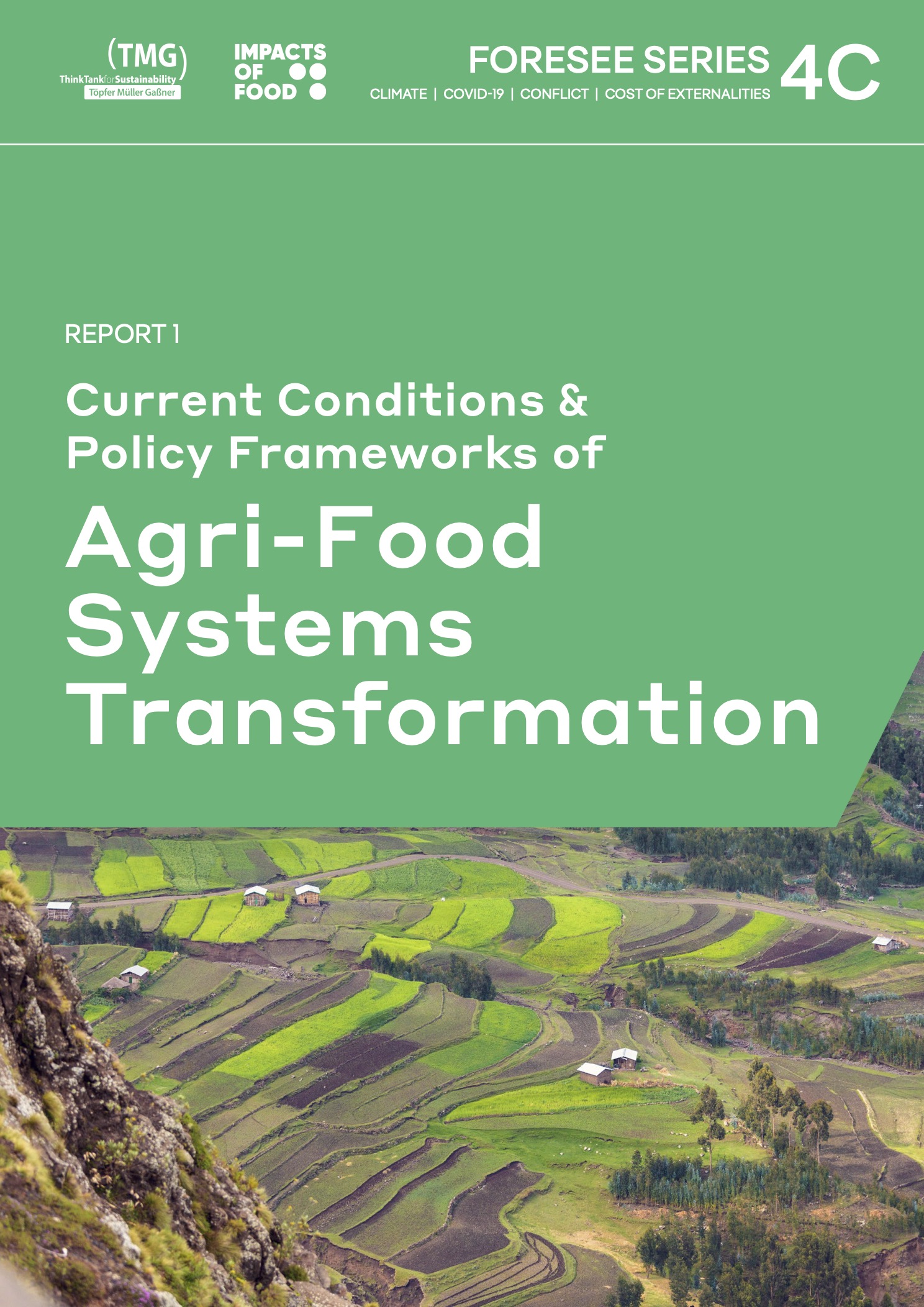
Report
FORESEE (4C) Report 1: Current Conditions and Policy Frameworks of Agri-Food Systems Transformation
Analysing the 4Cs and their interaction with agri-food systems
Written by Olivia Riemer, Tavseef Mairaj Shah, Sarah Zitterbarth
Published on Apr 03, 2023
News & Blog Posts
TMG Research Featured in IEEP Podcast on Financing Agri-Food System Transformation
Think piece series exploring True Cost Accounting
Reimagining agrifood systems: from buzzwords to actionable change
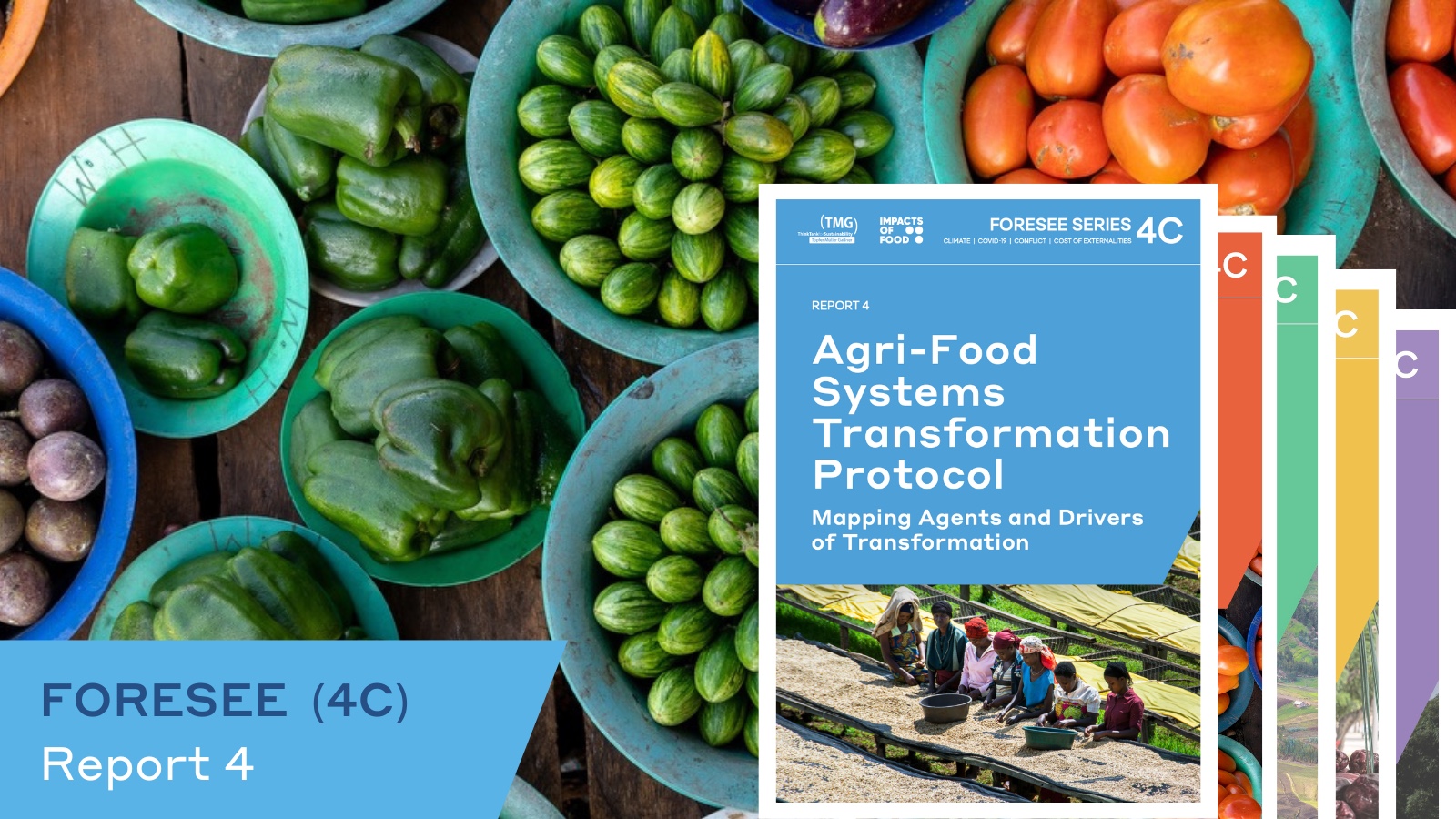
New Report Unveils Key Drivers and Agents for Global Agri-food Systems Transformation

Food system transformation requires strong Rio Conventions!



